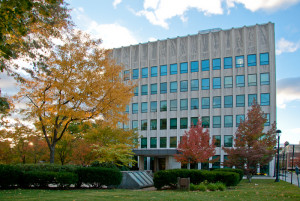 Brookline’s governing bodies consist mostly of volunteers. There are elected officials, like the members of the Board of Selectmen, who receive miniscule stipends, but that’s about it. While there are around 50 boards, committees, and commissions, staffed by volunteers and some town employees; the most important governing bodies are Town Meeting, the Board of Selectmen, and the Advisory Committee. Of course, if you have a parking issue, the Transportation Board may be most important to you and if the environment is your main concern the Climate Action Committee receives most of your attention. For the most part, though every major issue in town passes through the Big 3.
Brookline’s governing bodies consist mostly of volunteers. There are elected officials, like the members of the Board of Selectmen, who receive miniscule stipends, but that’s about it. While there are around 50 boards, committees, and commissions, staffed by volunteers and some town employees; the most important governing bodies are Town Meeting, the Board of Selectmen, and the Advisory Committee. Of course, if you have a parking issue, the Transportation Board may be most important to you and if the environment is your main concern the Climate Action Committee receives most of your attention. For the most part, though every major issue in town passes through the Big 3.
For a community the size of Brookline, that’s a whole lot of governing falling upon a relatively few dedicated individuals. Many volunteer on several committees and most of us do not know or appreciate what they do. We have our lives, and as long as the snow is plowed, our trash is picked up, the Police are there when we need them and we have electricity and water, most of are oblivious to how it all works.
Last week, only 7% of the town’s registered voters went to the polls on Election Day. Incredibly, only seventy-eight people ran for seventy-three Town Meeting seats, with a couple write-in candidates getting elected. So, how can we complain about our Town Government when, as a community, it’s usually not on our radar screen? We put it on our radar screen, that’s how. No matter how dedicated our volunteers are, we don’t get their best efforts when those efforts occur in a vacuum.
A recent incident involving the Advisory Committee deserves the town’s attention because it goes against basic principles upon which our community and nation stand. The difficulty is that by bringing issues to light, we risk injuring those we should be praising.
The AC’s Role in Governing Brookline
The Advisory Committee is one the most important cogs in our local government. We elect fellow residents to attend Town Meeting every May to vote on our budget and warrant articles. The Advisory Committee’s role is to advice Town Meeting on how to vote. They examine every budget line item, listen to the public during open hearings, discuss the issues and then vote on their recommendations to Town Meeting. The Board of Selectmen also passes on their recommendations; we’ll delve into their role in upcoming articles. My good friend Roger Lipson told me that serving on the Advisory Committee was one of the most difficult jobs he’s ever done. He said it was exhausting. The work includes intense research, late nights, and scrutiny from various interest groups in town.
Neil Wishinsky, Vice Chair of the Advisory Committee explains the role of the committee this way; “Governmental budgeting is an interesting exercise with every dollar going out the door having a constituency. But every year has to be approached anew, as things change. Whether it is the financial condition of the town, new competing priorities, natural disasters, whatever, there needs to be flexibility. And in the public sector, there needs to be checks and balances, The AC is an important check and balance. That is our role and while we could do things better and more efficiently (who couldn’t) I think we are doing as well as you can expect a bunch of volunteers doing this in their ‘spare time’ out of a sense of public service. I also think the moderator does a really good job of making sure the AC reflects the broad political spectrum of the town.”
The Advisory Committee includes a representative from each of the town’s sixteen precincts and at-large seats. There are presently eight at-large seats on the AC. Our Town Moderator Sandy Gadsby personally chooses each Advisory Committee member. The Town Moderator is chosen in the General Election every three years. To be a good Town Moderator, and most feel Sandy is a great one, it requires intelligence, inside out knowledge of meeting procedures, the ability to work with a large group, and the ability to easily navigate through complex issues.
Most would assume that the AC is a political body because it votes on our town budget and all warrant articles. According to Sandy Gadsby, however, the AC is intended to function as a finance committee and is supposed to be non-political in nature. While this may be technically true, most would assume that the sixteen committee members who represent each of the sixteen precincts would be chock-full of political agendas. Having a political agenda is not necessarily a bad thing, but the purpose of having a committee this large should be to balance out those agendas. The AC is an arm of TM intended to provide objective advice to Town Meeting, but the idea of the AC providing objective advise, given the makeup of each body, seems counter-intuitive.
Voted Out But Still Holding Office?
Here is the situation. Some of the at-large AC seats were appointed to individuals who were voted out of Town Meeting by their districts. Since 94.6% of the people that run for Town Meeting are elected, getting voted out as an incumbent is a mean feat. The reason the AC expanded to eight at-large positions was to fill seats with experts in various fields. It’s hard to argue that Sandy Gadsby doesn’t choose at-large members with the best of intentions and the greater good in mind. It is also true that there is a small base of people willing to volunteer for the position, so the “you got to take what you can get” theory has merit. The unintended consequences of appointing Advisory Committee members who have been ousted by Town Meeting, however, is that it raises the question whether the will of the voters is really being served, especially when it appears obvious that people were voted out of Town Meeting for a reason.
No Way to Enforce A Code of Conduct
In the last few weeks, one AC member crossed almost every line of decency someone in that position of power could cross. The context was a line item vote to retain or eliminate a position held by one person. The member in question spread mistruths, slander, and even offered a veiled threat toward the current position holder. The AC member in question publicly shared misinformation with many active members of the community, including myself. While this campaign was most assuredly ignored by many, it also most likely influenced some and caused harm to the victim.
The way this person voted on this particular line item is not the issue. There are dedicated AC members who voted the same way for honorable reasons. The issue at hand is not how people vote, but how they conduct themselves while serving their community.
I’ve chosen not to identify this committee member by name because embarrassing people is not what this publication is about, and this one instance is a manifestation of the problem, not the root cause. The greater issue is that the system allows misuse of power. Governments are ripe for corruption not because some people do the wrong thing, but because the system is conducive to corruption.
The situation was immediately reported to Harry Bohrs, Chairman of the Advisory Committee, and Sandy Gadsby. I’ve worked with Harry for the last few years and I cannot think of anyone more deserving of respect in our community. I am confident that Harry and Sandy are doing what they can to prevent this from re-occurring in the future.
The problem, according to Sandy, is that there is no legal mechanism to remove an Advisory Committee member for “cause”. This means that no matter what an individual does while serving on the Committee, they cannot be removed. Keep in mind that unlike the Board of Selectmen and Town Meeting, the Advisory Committee is not an elected office. One person appoints them and not even that person can remove them before their term is up no matter what they do.
Where Does This Leave Brookline?
So what do we end up with here? We’ve got an Advisory Committee comprised of people who represent diverse political and fiscal views. These people deserve a big “we’re not worthy” bow from the rest of us, but without a mechanism to enforce appropriate conduct of AC members, their reputation as a body and our town’s wellbeing is vulnerable and there is not much any of us can do about it. This is the case unless we, as a community, rethink the rules governing the Advisory Committee so that this violation of our community values is not allowed to happen again.
R. Harvey Bravman, Publisher








